
|
Astronomy Picture Of the Day (APOD)
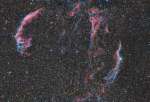 Wisps of the Veil Nebula
Wisps of the Veil Nebula
26.11.2012
Wisps like this are all that remain visible of a Milky Way star. About 9,000 years ago that star exploded in a supernova leaving the Veil Nebula, also known as the Cygnus Loop.
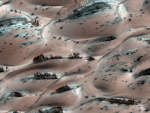 Dark Sand Cascades on Mars
Dark Sand Cascades on Mars
25.11.2012
They might look like trees on Mars, but they're not. Groups of dark brown streaks have been photographed by the Mars Reconnaissance Orbiter on melting pinkish sand dunes covered with light frost. The above image was taken in 2008 April near the North Pole of Mars.
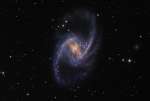 NGC 1365: Majestic Spiral with Supernova
NGC 1365: Majestic Spiral with Supernova
24.11.2012
Barred spiral galaxy NGC 1365 is truly a majestic island universe some 200,000 light-years across. Located a mere 60 million light-years away toward the chemical constellation Fornax, NGC 1365 is a dominant member of the well-studied Fornax galaxy cluster.
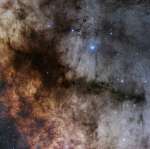 The Pipe Nebula
The Pipe Nebula
23.11.2012
East of Antares, dark markings sprawl through crowded star fields toward the center of our Milky Way Galaxy. Cataloged in the early 20th century by astronomer E. E. Barnard, the obscuring interstellar dust clouds include B59, B72, B77 and B78, seen in silhouette against the starry background.
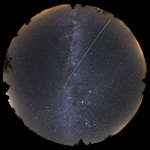 Night of the Long Leonid
Night of the Long Leonid
22.11.2012
A cosmic grain of sand left the long and colorful trail across this all-sky view. Its grazing impact with planet Earth's atmosphere began at 71 kilometers per second. With the Milky Way stretching...
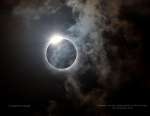 Diamond Ring and Shadow Bands
Diamond Ring and Shadow Bands
21.11.2012
As the total phase of last week's solar eclipse came to an end, sunlight streaming past the edge of the Moon created the fleeting appearance of a glistening diamond ring in the sky.
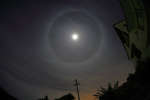 A Halo Around the Moon
A Halo Around the Moon
20.11.2012
Have you ever seen a halo around the Moon? This fairly common sight occurs when high thin clouds containing millions of tiny ice crystals cover much of the sky. Each ice crystal acts like a miniature lens.
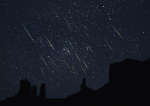 Leonids Over Monument Valley
Leonids Over Monument Valley
19.11.2012
What's happening in the sky over Monument Valley? A meteor shower. Over the past weekend the Leonid meteor shower has been peaking. The image -- actually a composite of six exposures of about 30 seconds each -- was taken in 2001, a year when there was a much more active Leonids shower.
 NGC 6357s Cathedral to Massive Stars
NGC 6357s Cathedral to Massive Stars
18.11.2012
How massive can a normal star be? Estimates made from distance, brightness and standard solar models had given one star in the open cluster Pismis 24 over 200 times the mass of our Sun, nearly making it the record holder.
 Like a Diamond in the Sky
Like a Diamond in the Sky
17.11.2012
A dark Sun hung over Queensland, Australia on Wednesday morning during a much anticipated total solar eclipse. Storm clouds threatened to spoil the view along the northern coast, but minutes before totality the clouds parted.
|
January February March April May June July August September October November December |
||||||||||||||||||||||||||||||||||||||||||||||||||||||||